Alain, Jehan - Ave Maria sur une vocalise dorienne
 for sopr. solo and organ
for sopr. solo and organ
year of composition / 1st publication: 1937
 | Composer: Jehan Alain (1911-1940) website aliases, aka: Jehan Ariste Alain Country of origin / activity: France | |
| Text author: traditional / adapted by Albert Alain (1880-1971), 1942 Country of origin / activity: France | ||
| Arranger / Editor: N/A |
| MIDI | MP3 | VID | First name | Last name | Birth | Death | comp | ID # | Title | Voicing | Instrumentation | |
|---|---|---|---|---|---|---|---|---|---|---|---|---|
| 0 | 0 | 1 | 1 | Albert | Alain | 1880 | 1971 | Sancta Maria | ||||
| 0 | 0 | 0 | 0 | Albert | Alain | 1880 | 1971 | Ave Maria | SSA | |||
| 1 | 1 | 1 | 1 | Jehan | Alain | 1911 | 1940 | 1937 | Ave Maria sur une "vocalise dorienne" | soprano | organ |
Available documentation:
Score: available in Ave Maria, gratia plena Ave Maria settings for solo voice and organ Publ. Bärenreiter (2005) 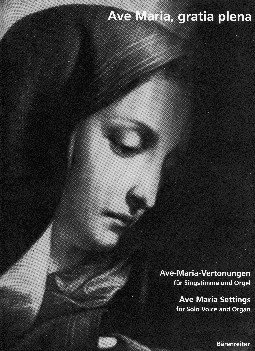 My thanks and appreciation to Jeanne Buyens (Brussels, Belgium) for sending me this score. | 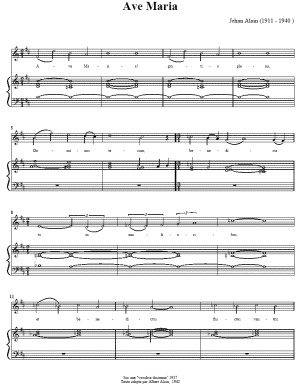 |
Lyrics:
| A-ve Ma-ri-a! gra-ti-a ple-na, Do-mi-nus te-cum, be-ne-di-cta tu in mu-li-e-ri-bus, et be-ne-di-ctus fru-ctus ven-tris tu-i, Je-sus. | San-cta Ma-ri-a, Ma-ter De-i, o-ra pro no-bis, o-ra pro no-bis pec-ca-to-ri-bus, nunc et in ho-ra mor-tis nos-trae, A-men. |
| MIDI: | MP3: |
| Play / stop MIDI | Play / stop mp3-sample CD: Les plus beaux Ave Maria - Beatrice Gobin |
Recordings:
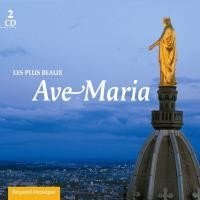  | 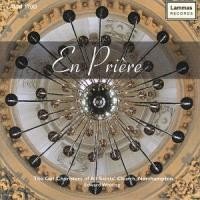 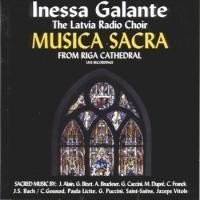 |
Video - posted on YouTube:
Internet references, biography information:
| http://en.wikipedia.org/wiki/Jehan_Alain |
| Jehan Ariste Alain (3 February 1911 – 20 June 1940) was a French organist and composer. Biography Alain was born in Saint-Germain-en-Laye in the western suburbs of Paris, into a family of musicians. His father, Albert Alain (1880–1971) was an enthusiastic organist, composer and organ-builder who had studied with Alexandre Guilmant and Louis Vierne. His younger brother was the composer, organist and pianist Olivier Alain (1918–1994), his youngest sister the organist Marie-Claire Alain (1926–2013). Jehan received his initial training in the piano from Augustin Pierson, the organist of Saint-Louis at Versailles, and in the organ from his father, who had built a four-manual instrument in the family sitting room. By the age of 11, Jehan was substituting at St. Germain-en-Laye. Between 1927 and 1939, he attended the Paris Conservatoire and achieved First Prize in Harmony under André Bloch and First Prize in Fugue with Georges Caussade. He studied the organ with Marcel Dupré, under whose direction he took first prize for Organ and Improvisation in 1939. His studies in composition with Paul Dukas and Jean Roger-Ducasse won him the Prix des amis de l'orgue in 1936 for his Suite for Organ Op. 48, Introduction, Variations, Scherzo and Choral. He was appointed organist of Saint-Nicholas de Maisons Lafitte in Paris in 1935, and remained there for four years. He also played regularly at the Rue Notre-Dame-de-Nazareth synagogue, where the only known recording of his playing—a six-minute improvisation—was made in 1938. His short career as a composer began in 1929, when Alain was 18, and lasted until the outbreak of the Second World War 10 years later. His output was influenced not only by the musical language of the earlier Claude Debussy and his contemporary Olivier Messiaen (seen in Le jardin suspendu, 1934), but also by an interest in the music, dance and philosophies of the far east (acquired at the Exposition coloniale internationale of 1931 and seen in Deux danses à Agni Yavishta, 1932, and Deuxième fantaisie, 1936), a renaissance of baroque music (seen in Variations sur un thème de Clément Janequin, 1937), and in jazz (seen in Trois danses of 1939). He wrote choral music, including a Requiem mass, chamber music, songs and three volumes of piano music. But it is his organ music for which he is best known. His most famous work, Litanies, is prefaced with the text: Quand l’âme chrétienne ne trouve plus de mots nouveaux dans la détresse pour implorer la miséricorde de Dieu, elle répète sans cesse la même invocation avec une foi véhémente. La raison atteint sa limite. Seule la foi poursuit son ascension. (When, in its distress, the christian soul can find no more words to implore the mercy of God, it repeats, times without end, the same fierce-faithed prayer. Reason reaches its limits and only belief can chase its flight.) Deuils ('mourning'), the second of the Trois danses, is dedicated to Odile as a Funeral Dance to an Heroic Memory. Always interested in mechanics, Alain was a skilled motorcyclist and became a dispatch rider in the Eighth Motorised Armour Division of the French Army. On 20 June 1940, he was assigned to reconnoitre the German advance on the eastern side of Saumur, and encountered a group of German soldiers at Le Petit-Puy. Coming around a curve, and hearing the approaching tread of the Germans, he abandoned his motorcycle and engaged the enemy troops with his carbine, killing 16 of them before being killed himself. He was posthumously awarded the Croix de Guerre for his bravery,[1] and according to Nicolas Slonimsky was buried, by the Germans, with full military honours.[2] He left behind his wife, Madeleine Payan whom he had married in 1935, their three children, and a musical output viewed by many to have been amongst the most original of the 20th century. Henri Dutilleux's Les citations contains a quotation from Jehan Alain's music. Maurice Duruflé wrote a musical tribute to Jehan Alain with his Prélude et fugue sur le nom d'A.L.A.I.N op. 7 for organ. |
| http://www.bach-cantatas.com/Bio/Alain-Marie-Claire.htm |
| Marie Claire-Alain (Organ) Born: August 10, 1926 - Saint-Germain-en-Laye, near Paris, France Died: February 26, 2013. The renowned French organist and pedagogue, Marie-Claire Alain, was the youngest child in a family of distinguished musicians.
|
Page last modified: November 16, 2013
 avemariasongs
avemariasongs org
org